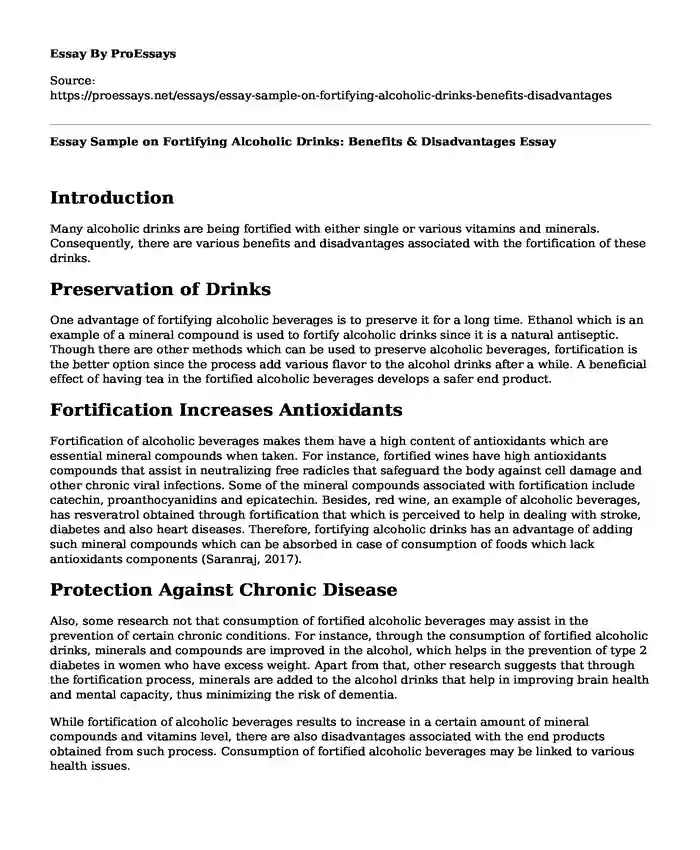Introduction
Many alcoholic drinks are being fortified with either single or various vitamins and minerals. Consequently, there are various benefits and disadvantages associated with the fortification of these drinks.
Preservation of Drinks
One advantage of fortifying alcoholic beverages is to preserve it for a long time. Ethanol which is an example of a mineral compound is used to fortify alcoholic drinks since it is a natural antiseptic. Though there are other methods which can be used to preserve alcoholic beverages, fortification is the better option since the process add various flavor to the alcohol drinks after a while. A beneficial effect of having tea in the fortified alcoholic beverages develops a safer end product.
Fortification Increases Antioxidants
Fortification of alcoholic beverages makes them have a high content of antioxidants which are essential mineral compounds when taken. For instance, fortified wines have high antioxidants compounds that assist in neutralizing free radicles that safeguard the body against cell damage and other chronic viral infections. Some of the mineral compounds associated with fortification include catechin, proanthocyanidins and epicatechin. Besides, red wine, an example of alcoholic beverages, has resveratrol obtained through fortification that which is perceived to help in dealing with stroke, diabetes and also heart diseases. Therefore, fortifying alcoholic drinks has an advantage of adding such mineral compounds which can be absorbed in case of consumption of foods which lack antioxidants components (Saranraj, 2017).
Protection Against Chronic Disease
Also, some research not that consumption of fortified alcoholic beverages may assist in the prevention of certain chronic conditions. For instance, through the consumption of fortified alcoholic drinks, minerals and compounds are improved in the alcohol, which helps in the prevention of type 2 diabetes in women who have excess weight. Apart from that, other research suggests that through the fortification process, minerals are added to the alcohol drinks that help in improving brain health and mental capacity, thus minimizing the risk of dementia.
While fortification of alcoholic beverages results to increase in a certain amount of mineral compounds and vitamins level, there are also disadvantages associated with the end products obtained from such process. Consumption of fortified alcoholic beverages may be linked to various health issues.
Fortified Alcoholic Drinks Have High Calories
Compared to unfortified alcoholic beverages, fortified alcoholic drinks usually leads to an increase in their calories content. Various alcohol beverages increase their calories content during fortification. Though fortified alcoholic beverages are typically consumed in smaller servings as compared to the regular alcoholic drinks, drinking too much can cause calories to stack up much faster, thus increasing the risk of gaining weight. The serving size can vary based on the alcohol content, but a single serving of fortified alcoholic beverages is approximately 88 ml.
Contains More Alcohol
Another disadvantage of fortifying alcoholic beverages is that it increases the percentage of alcohol in the drinks. Wines which are fortified have a much higher content of alcohol as compared to the unfortified varieties. During the fortification process, there usually is the addition of the spirits which are distilled spirits, for example, brandy, a fortified alcoholic beverage wine contains about 17–20% alcohol, as compared to the original alcohol content of 10–15% for ordinary alcohol beverage. Therefore an addiction to consuming alcohol beverages which are fortified may end up causing alcohol dependence. It can end up triggering withdrawal symptoms when usage such alcohol drinks are discontinued. Consumption of fortified alcohol drinks with high alcohol content results to liver disease, brain damage and heart failure weight gain (Saranraj, 2017).
High in Sugar
Fortification of alcohol drinks increases their sugar level, for instance, wine when made from grapes. Through the fortification process, alcoholic beverages increase and pack their sugar content since, during the fermentation process, spirits are added to the alcoholic drinks before sugars are converted to alcohol. Apart from that, other types of alcoholic beverages are sweetened after undergoing the fermentation process, thus increasing their sugar level. For example, port wines which are part of the desert wines increasing their sugar level by approximately 7 grams of sugar per 3-ounce serving. Taking such a high amount of sugar in the fortified alcoholic beverages has resulted in various health issues such as obesity, liver associated disease, diabetes, among other types of disease. As a result, consumption of about one bottle of fortified alcoholic beverages’ can result to a health issue of restricting taking foods rich in sugar content to avoid as part of moderating healthy diet for the alcoholic addicts.
References
Saranraj, P., Sivasakthivelan, P., & Naveen, M. (2017). Fermentation of fruit wine and its quality analysis: a review. AJST, 1, 85-97.
Vitamins and minerals "fortification" in alcohol drinks pdf, v. (2020). [Ebook]. Retrieved 1 July 2020.
Cite this page
Essay Sample on Fortifying Alcoholic Drinks: Benefits & Disadvantages. (2023, Sep 17). Retrieved from https://proessays.net/essays/essay-sample-on-fortifying-alcoholic-drinks-benefits-disadvantages
If you are the original author of this essay and no longer wish to have it published on the ProEssays website, please click below to request its removal:
- Paper Example on Program of YSB
- Cognitive Behavior Therapy in Social Work Essay
- Essay Sample on Key Issues in Pharmaceutical Industry Supply Chains
- Fuel Your Lacrosse Performance With Proper Nutrition - Essay Sample
- Americans Love Starbucks Despite Preferring Competitors' Coffee Quality
- Academic Dishonesty: Impact on Nursing Enrollment - Essay Sample
- Essay on Ensuring Public Health: A Comprehensive Overview of the California Health and Safety Code







